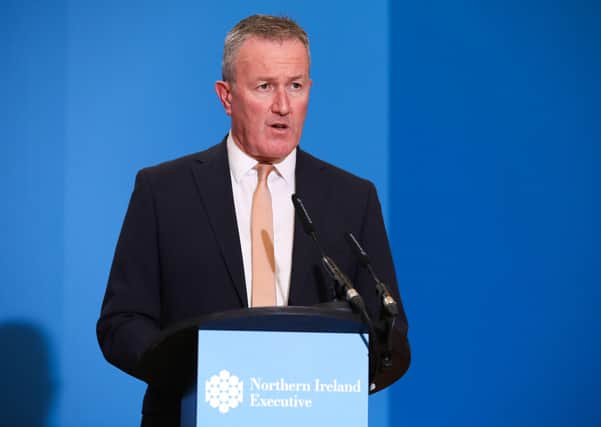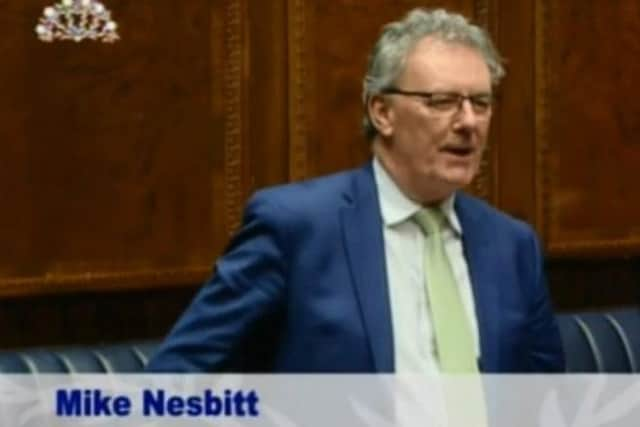Mike Nesbitt: Why I am trying to reform Northern Ireland’s libel laws


There were times I thought the current big two parties were going to vote it down, which would have been fatal to its progress to the next stage.
Now, it passes to the Committee for Finance for close scrutiny. It is clear that in-depth examination will focus on a number of clauses that are giving members concern.
Advertisement
Hide AdAdvertisement
Hide AdBefore diving into the detail, I should make the case for asking the Assembly to devote time to reforming our laws of defamation. After all, it’s not exactly the first topic of conversation around the water cooler.


For me, it is a question of rights, in this case, striking an appropriate balance between the right to Freedom of Expression and the right to protect your reputation. Both of those rights are qualified rather than absolute. Your right to free speech does not extend to bursting into a crowded theatre and shouting “Fire!” where no fire exists. Equally, you should only have a defence of your reputation from untrue, unfair, unwarranted attack. If the attack is based on truth, you are fair game.
Every now and then, an invention transforms how we communicate with each other: the printing press; the telephone; the radio; television; above all, the World Wide Web. As our laws pre-date the invention of the internet, where reputations are trashed every minute of every day, there was a clear argument for review and reform.
Having spent around half of my adult life as a journalist, I have an enduring interest in the media and the obstacles journalists face in honest, accurate and necessary reporting and investigation, particularly of government.
Advertisement
Hide AdAdvertisement
Hide AdIn London or Dublin, that scrutiny is conducted by three groups of people. There is an Official Opposition in Dáil Éireann and the House of Commons. There is a second, revising house, in the House of Lords and Seanad Éireann. And there is the media.
In Northern Ireland, we have only the third prong of the trident, so the role of the media in scrutinising our Executive is all the more important. Yet, journalists have less protection in our jurisdiction than elsewhere.
A key policy objective of my Bill is to protect journalists conducting responsible and necessary investigations.
The Bill is not just about journalism. Academics and scientists are more open to lawfare here than in England and Wales, because the 2013 Defamation Act passed by Westminster affords them privilege in publishing papers critical of others, if those papers have been peer reviewed. It is also argued by experts, such as Guy, Lord Black (former Executive Director of the Telegraph Group in London) that our antiquated laws will deter investment from the likes of Twitter and Facebook in Northern Ireland.
Advertisement
Hide AdAdvertisement
Hide AdI think most members speaking in the debate this week agreed that reform is needed. When the erstwhile NI Law Commission examined defamation in 2016, their report concluded that the key imbalance was not between whether we should favour reputation over free speech or vice versa; rather, it was between those with deep pockets and those who cannot afford to defend themselves. In other words, it’s not about law, but money. Plainly, that needs fixed.
The next phase sees my Bill under the spotlight of the statutory Committee for Finance. They will examine it, clause by clause. I liken it to a tall building constructed of Lego. They will dismantle it, examining it brick by brick. Then they will put it back together, but not necessarily the way it was. It might be missing a storey or two, or might even have an extension fitted
The Finance Minister, Conor Murphy, is not supportive of what I am doing. He wants to wait. He thinks we should see what Dublin is going to do. He says there is no need to rush. The first record of me raising defamation in the Assembly is dated the 28th March 2013, eight and a half years ago. If that is rushing, I wish him luck securing the vote of anyone interested in efficient, effective government!
Often, there is no “right answer” but rather a series of options, each with a downside that will required managed if chosen. That is the case with any reform of defamation. As the Russian author Ivan Turgenev puts it “If we wait for the moment when everything, absolutely everything is ready, we shall never begin.”
We have begun.
Advertisement
Hide AdAdvertisement
Hide Ad• Mike Nesbitt is an Ulster Unionist MLA and former leader of the party
——— ———
A message from the Editor:
Thank you for reading this story on our website. While I have your attention, I also have an important request to make of you.
With the coronavirus lockdown having a major impact on many of our advertisers — and consequently the revenue we receive — we are more reliant than ever on you taking out a digital subscription.
Advertisement
Hide AdAdvertisement
Hide AdSubscribe to newsletter.co.uk and enjoy unlimited access to the best Northern Ireland and UK news and information online and on our app. With a digital subscription, you can read more than 5 articles, see fewer ads, enjoy faster load times, and get access to exclusive newsletters and content. Visit https://www.newsletter.co.uk/subscriptions now to sign up.
Our journalism costs money and we rely on advertising, print and digital revenues to help to support them. By supporting us, we are able to support you in providing trusted, fact-checked content for this website.
Ben Lowry
Acting Editor